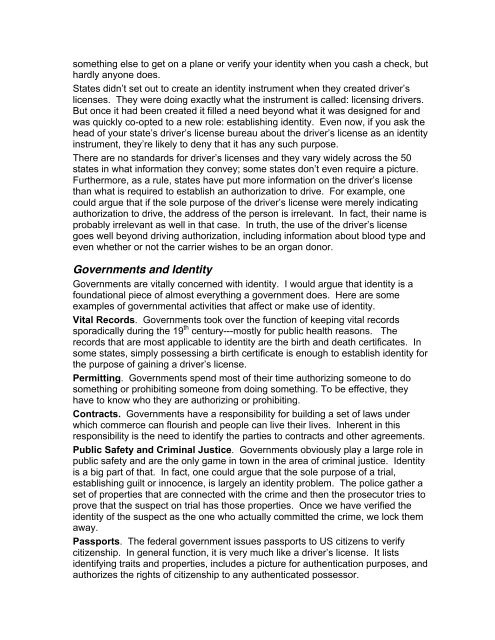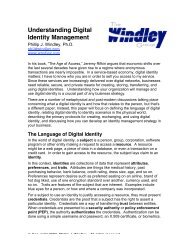Digital ID and eGovernment - Phil Windley's Technometria
Digital ID and eGovernment - Phil Windley's Technometria
Digital ID and eGovernment - Phil Windley's Technometria
- No tags were found...
You also want an ePaper? Increase the reach of your titles
YUMPU automatically turns print PDFs into web optimized ePapers that Google loves.
something else to get on a plane or verify your identity when you cash a check, buthardly anyone does.States didn’t set out to create an identity instrument when they created driver’slicenses. They were doing exactly what the instrument is called: licensing drivers.But once it had been created it filled a need beyond what it was designed for <strong>and</strong>was quickly co-opted to a new role: establishing identity. Even now, if you ask thehead of your state’s driver’s license bureau about the driver’s license as an identityinstrument, they’re likely to deny that it has any such purpose.There are no st<strong>and</strong>ards for driver’s licenses <strong>and</strong> they vary widely across the 50states in what information they convey; some states don’t even require a picture.Furthermore, as a rule, states have put more information on the driver’s licensethan what is required to establish an authorization to drive. For example, onecould argue that if the sole purpose of the driver’s license were merely indicatingauthorization to drive, the address of the person is irrelevant. In fact, their name isprobably irrelevant as well in that case. In truth, the use of the driver’s licensegoes well beyond driving authorization, including information about blood type <strong>and</strong>even whether or not the carrier wishes to be an organ donor.Governments <strong>and</strong> IdentityGovernments are vitally concerned with identity. I would argue that identity is afoundational piece of almost everything a government does. Here are someexamples of governmental activities that affect or make use of identity.Vital Records. Governments took over the function of keeping vital recordssporadically during the 19 th century---mostly for public health reasons. Therecords that are most applicable to identity are the birth <strong>and</strong> death certificates. Insome states, simply possessing a birth certificate is enough to establish identity forthe purpose of gaining a driver’s license.Permitting. Governments spend most of their time authorizing someone to dosomething or prohibiting someone from doing something. To be effective, theyhave to know who they are authorizing or prohibiting.Contracts. Governments have a responsibility for building a set of laws underwhich commerce can flourish <strong>and</strong> people can live their lives. Inherent in thisresponsibility is the need to identify the parties to contracts <strong>and</strong> other agreements.Public Safety <strong>and</strong> Criminal Justice. Governments obviously play a large role inpublic safety <strong>and</strong> are the only game in town in the area of criminal justice. Identityis a big part of that. In fact, one could argue that the sole purpose of a trial,establishing guilt or innocence, is largely an identity problem. The police gather aset of properties that are connected with the crime <strong>and</strong> then the prosecutor tries toprove that the suspect on trial has those properties. Once we have verified theidentity of the suspect as the one who actually committed the crime, we lock themaway.Passports. The federal government issues passports to US citizens to verifycitizenship. In general function, it is very much like a driver’s license. It listsidentifying traits <strong>and</strong> properties, includes a picture for authentication purposes, <strong>and</strong>authorizes the rights of citizenship to any authenticated possessor.






